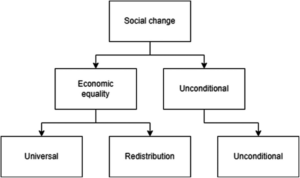
As interest in universal basic income (UBI) policy has peaked in recent years, the study of public support for such a policy is rapidly developing. While recent studies recognise the multidimensionality of the UBI proposal, we still know little about to what extent support for UBI is unambiguously supported or rejected. We show that the public holds distinct but related opinions towards three dimensions of UBI: universalism, redistribution and unconditionality. The higher and lower educated are equally ambivalent towards the policy, suggesting a lack of political entrenchment towards UBI in Dutch society. Post hoc comparisons show that key demographics and constituencies support some dimensions while rejecting others, enabling both compromise and division on the issue. Despite these distinct controversies, however, the strong correlation between attitudinal dimensions suggests that survey experiments tend to overstate the degree of multidimensionality by ignoring the strong commonalities in support for policy aspects.
Gielens, E., Roosma, F., & Achterberg, P. (2023). Dimensions of controversy: Investigating the structure of public support for Universal Basic Income in the Netherlands. International Journal of Social Welfare.
